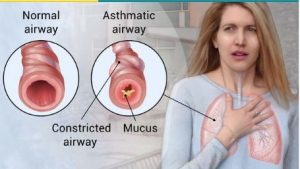About one in nine to ten Australians have asthma. Asthma cannot be cured, but with good management, people with asthma can lead normal, active lives.
What is asthma?
Asthma is a medical condition that affects the airways (the breathing tubes that carry air into our lungs). From time to time, people with asthma find it harder to breathe in and out, because the airways in their lungs become narrower – like trying to breathe through a thin straw. At other times their breathing is normal.
There is no cure for asthma, but it can usually be well controlled. Most people with asthma can stay active and have a healthy life.
For good control of asthma, you need:
- medicines – taken the right way, at the right time
- regular medical visits for check-ups and to learn more about living with asthma
- an action plan, so you know exactly what to do when symptoms happen
 Causes of asthma
Causes of asthma
The triggers for asthma symptoms vary for different people. Some common triggers are:
- allergy triggers such as house dust mites, pollens, pets and moulds
- cigarette smoke
- viral infections – for example, colds and flu
- cold air or changes in the weather
- work-related triggers – eg. wood dust, chemicals, metal salts
- some medication.
Signs you are having an asthma attack
- You have increasing wheezing, cough, chest tightness or shortness of breath
- You are waking often at night with asthma symptoms
- You need to use your reliever again within 3 hours
In an emergency, always call triple zero (000) and ask for an ambulance. Tell the operator that someone is having an asthma attack.
Management of asthma
Asthma can be well controlled with the appropriate medication in almost all people. The main types of asthma medication are:
- relievers that act quickly to relax the muscles around the airways – this is the medication used during an asthma attack
- preventers that slowly make the airways less sensitive to triggers and reduce inflammation inside the airways – they are taken daily to help keep you well
- combination therapies that are preventers containing two different medicines.
Your GP will prescribe the correct medication and explain how to use it.
For good asthma management it is important that you:
- See your GP for regular check-ups and work together to manage your asthma
- Understand what triggers your asthma – this can be different for everyone
- Try to avoid or reduce your exposure to these triggers
- Use your medications as instructed by your GP, even when you feel well
- Make sure you are using your inhaler (puffer) correctly, including using a spacer where required
- Follow your written asthma plan
Ask your GP for a personal written asthma action plan.
As well as being a reminder of your usual treatment, an action plan helps you to recognise worsening asthma and tells you what to do in response.
If your child has asthma, give copies of the action plan to the school and to anyone else who regularly looks after your child.
Thunderstorm Asthma
During grass pollen season people may notice an increase in asthma and hay fever. Geelong’s grass pollen season (October through December) also brings the chance of thunderstorm asthma.
Thunderstorm asthma is thought to be triggered by a unique combination of high amounts of grass pollen in the air and a certain type of thunderstorm. For people who have asthma or hay fever this can trigger severe asthma symptoms.
When a large number of people develop asthma symptoms over a short period of time, related to high grass pollen and a certain type of thunderstorm, it is known as epidemic thunderstorm asthma.
If you’ve ever had asthma – talk to your GP about what you can do to help protect yourself from the risk of thunderstorm asthma. Remember, taking an asthma preventer properly and regularly is key to preventing asthma, including thunderstorm asthma.
Good resources for further reading: Better Health Channel and National Asthma Council Australia.
Disclaimer: This blog provides general information and discussion about health and related subjects. The words and other content provided in this blog, and in any linked materials, are not intended and should not be construed as medical advice. If the reader or any other person has a medical concern, he or she should consult with a GP. Links to other (“third party”) websites are provided solely as a convenience and not as a guarantee or recommendation by Park Street General Practice for the services, information, opinion or any other content on such third party websites or as an indication of any affiliation, sponsorship or endorsement of such third party websites. Reference: Better Health Channel and National Asthma Council Australia.






